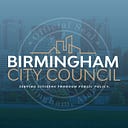Council President Pro Tem Alexander discusses the process of bringing 5G to Birmingham
Sitting behind her desk, Birmingham Council President Pro Tem Wardine Alexander flashed a smile when asked about the process of bringing 5G/small cell technology to Birmingham.
“It’s been something we on the Utilities Committee have been working very hard on for the last several, several months,” said Alexander, who chairs the Council’s Utilities Committee.
Over the last year, Alexander has regularly brought members of the major telecom companies to committee in order to discuss the potential of having 5G/small cell towers in Birmingham.
All four of the major providers in the United States have some form of 5G wireless capabilities. Birmingham is one of 15 cities nationwide that AT&T has selected for potential deployment of the latest generation of cellular technology in 2020– 5G brings faster speeds, lower latency periods and the ability to connect more smart devices.
From a hardware standpoint, 5G antennas are roughly the size of two stacked rolls of paper towels that are installed on either new or existing poles, often located on city rights of way.
Alexander sat down with Cody Owens, who works in the Council’s Public Information Office, to talk about the Utilities Committee process and what the next steps are in bringing 5G to the Magic City.
I know it’s been a long process, but could you fill us in on how your committee has approached the complex issue of bringing this technology to Birmingham?
Alexander: We’re currently working on an ordinance that would determine how we regulate those telecom companies as well as the placement of the 5G apparatuses. For me, I’m excited because it gives everyone in our city greater capabilities. It puts mothers in touch with their children. When someone is at the Magic City Classic they won’t have a problem making a phone call or sending a text. This new technology will put us in line with other cities around the country.
You’ve played a very key role in bringing together all the major telecom companies and local business leaders to discuss how this will work. Why do you think that’s important?
Alexander: I think the providers see this as an opportunity to expand and improve their businesses. Not only that but enhance the lives and connectivity of our citizens. These new capabilities will drastically improve communications throughout the city and that extends to businesses as well. Any ordinance that we pass should have input from all our stakeholders. We want to make sure our ordinance is airtight and that requires having a lot of conversations with various companies, telecom providers, lawmakers and citizens.
Earlier this year, the state legislature considered a bill that would have impacted the way cities can regulate the deployment of 5G technology. Ultimately the bill did not pass. What does this mean for cities like Birmingham that are looking to bring this technology to their residents?
Alexander: Two things have really impacted this being available to the citizens of Birmingham. First, there were some Federal Communications Commission (FCC) issues. Members of the Utilities Committee actually went to the FCC headquarters in Washington DC to see what the rulings were going to be nationally. Then we encountered state legislation that could potentially impact our ordinance and how we would be dealing with the telecom companies. There was a bill in the state legislature earlier this year that did not move forward. During the next legislative session I expect there to be another piece of legislation that might have an impact on any local ordinance we pass.
What are the next steps in regards to 5G being available in Birmingham?
Alexander: We are going to continue to work with the telecom providers and our citizens to be sure they understand how this new technology will impact their lives. We want to make sure that any stakeholders that could be impacted by the placement of these towers on our rights of way be kept up to speed on any new developments. We want to ensure that we have an ordinance that will open the door for this new technology but also protects the City and the rights of each and every one of our citizens.
As for the Utilities Committee, the next step for us is to work with the legal department to ensure that they have an outline and have reviewed all the details in the ordinance. We want to make sure it’s fair and works within the FCC regulations and any state legislation that might come into play. As soon as we work out those details we will bring this back to committee. My goal would be to vote that out of committee and bring it before the full council for approval in the near future.
